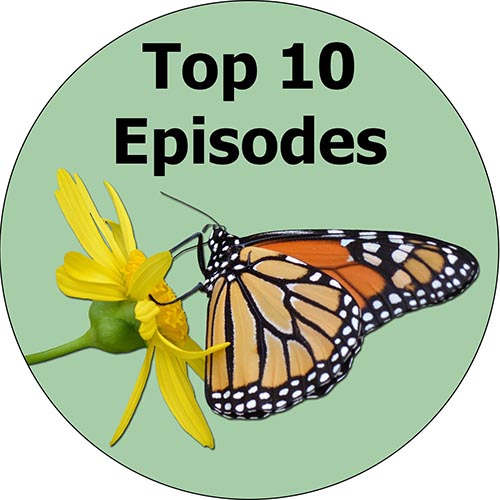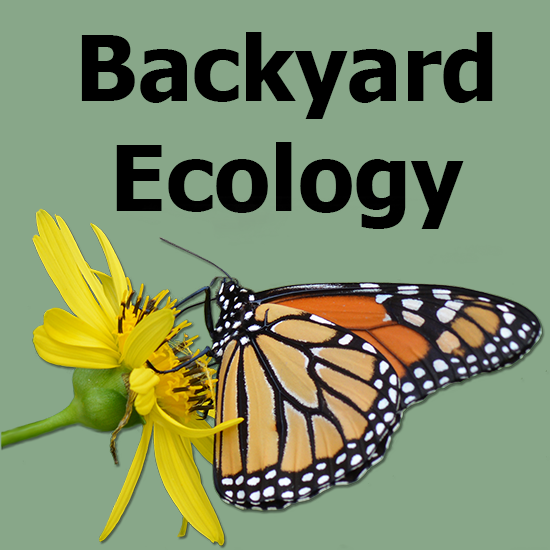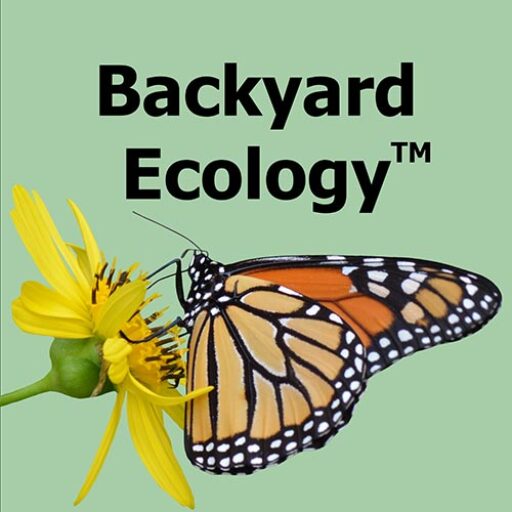
For the past several weeks, I’ve been doing top 10 roundups of the different types of Backyard Ecology content. We’ve talked about the videos, the blog articles, and the nature trivia style shorts. So, let’s wrap it up with a rundown of the top 10 podcast episodes of the year.
Like I said a couple of weeks ago when I shared the top 10 blog articles, I always like to do roundups at the end of every year because I know how easy it is to miss stuff. So, having a reminder at the end of the year for some of the episodes that others enjoyed and listened to the most can be helpful.
Also, I’ve learned over the last couple of years that most people who listen to the podcast episodes don’t read the blog articles, and vice versa, but everyone wants access to the same information. However, I was originally providing different types of information in each format, thinking that people would switch back and forth.
So, to serve my audience better and make the content more accessible, this summer I began recording my blog articles and creating transcripts of my podcast conversations. Now everyone can access the new content in the format they prefer. I like the change and have received quite a bit of positive feedback about it too.
The change makes figuring out the top 10 lists for the blog articles and podcast episodes a little more challenging this year, but I think it’s worth it. So, for the purposes of this year’s top 10 podcast episodes, I defined a podcast episode as a conversation that I had with another expert. I chose the top 10 that were published between October 1, 2022 and October 1, 2023 based on the number of downloads the episode had received as of Thanksgiving 2023.
So, here are this year’s top 10 Backyard Ecology podcast episodes. Some of them were published later in the year so have transcripts available, while others were published earlier in the year so don’t have transcripts available.
Top 10 Backyard Ecology Podcast Episodes
There was a tie for number 9 in the list, and somewhat surprisingly, both episodes were about birds. If you enjoy watching and learning about birds, then I highly recommend both these episodes.
9) Everything You Want to Know About Nesting Birds with NestWatch
In this episode, I talked with Holly Grant who is the Project Assistant for NestWatch which is a community science program based out of the Cornell Lab of Ornithology. Our conversation was a lot of fun and covered a wide range of topics related to nesting birds and NestWatch.
Towards the end of our conversation, Holly shares a great tip for anyone who commonly has wrens, or other birds, nest in their hanging baskets or other potted plants. Holly’s tip solves the problem of how to water your plant without disturbing the nest, which I know is a challenge that many people face. In fact, I asked the question because it is one my mother has asked me many times over the years, and I never had a good answer for her. I was very happy to have a good answer to give her this year.
9) Birding Tools and Technology to Help You Be a Better Birder
James Wheat, the president of the Kentucky Ornithological Society, joined me for this conversation. Our conversation focused on birding tools and technology that can be helpful for birders with any experience level.
We started our conversation by talking about binoculars and tips about what to look for when purchasing binoculars. Our conversation then moved to a discussion of several free birding apps that can be helpful whether you are just starting out or are already an expert birder.
8) Exploring Urban Ecology: Understanding and Appreciating Nature Where We Live
Did you know that urban ecology doesn’t just apply to big cities and towns? The broad category of urban ecology applies to any place where there is a lot of interaction between that place and a nearby town or city. Which means that urban ecology is likely to apply to most of us because even in fairly rural areas a large percentage of the population often commutes to the nearby cities or towns for work, school, shopping, etc.
In this episode, we talked with Dr. Sara Gagné. Sara is the author of the newly published book, Nature at Your Door, Connecting with the Wild and Green in the Urban and Suburban Landscape (affiliate link). She is also an Associate Professor of Landscape Ecology at the University of North Carolina, Charlotte. Our conversation covered what urban ecology really is, ways to make your urban or suburban property more attractive to wildlife, her book, and much more.
7) Why Are Invasive Species Something You Should Care About?
If you struggle with invasive species on your property and have ever thought “What’s the big deal? Why are they so bad?” or wondered how they got here, then you aren’t alone. Addressing those issues and questions is exactly why I recorded this episode with Anthony. If you don’t know Anthony, he’s my husband and the face of the Backyard Ecology YouTube channel.
Although invasive species aren’t limited to just plants, that’s the type of organisms that our conversation primarily focused on. We discussed a wide range of topics related to invasive species beginning with a conversation about what exactly is an invasive species and whether those species are inherently “bad.” We also talked about why it matters if a species is invasive, some of the negative impacts invasive species can have, and whether any of the short-term uses that pollinators and wildlife may gain from invasive species makes up for their negative impacts. We wrapped up our discussion by talking about how invasive species got here.
6) Moths: Unsung Heroes of Pollination and Beyond
Did you know that there are approximately 10 times more moth species worldwide than there are butterfly species? Or that without moths we would have fewer songbirds, less genetic diversity in many of our native plants, and lower harvests of many popular fruits? Or that creating better moth habitats around our homes also benefits our health and wellbeing?
In this episode, we talked with Dr. Elena Tartaglia. Elena is a co-founder of National Moth Week and a research associate at Rutgers University. We discussed the wide diversity of moths, the different roles they play in the ecosystem, how to attract moths to your property, how to observe moths on your property, and about National Moth Week which happens every year in July.
5) Gardening with Sedges – Mt. Cuba Center Carex Trial
The sedges, or more specifically members of the genus Carex, are a group of native plants which can be highly adaptable and serve multiple functions in our gardens, but have historically been overlooked for those purposes. In this episode, we talked with Sam Hoadley who is the Manager of Horticultural Research at Mt. Cuba Center in Delaware.
At the beginning of 2023, Mt. Cuba Center released their Carex trial report. This report evaluated 70 species and cultivars of Carex over 4 years for garden and landscape use in the Mid-Atlantic Region. During our conversation, Sam and I talked about how Mt. Cuba Center’s trials are conducted, the importance of sedges / Carex species, how they can be used in the garden or home landscape, and many other topics.
4) How Can Your State’s Native Plant Society Help You?
In this episode, we were joined by multiple guests representing native plant societies in different parts of the eastern U.S. Our guests were Randi Eckel from the Native Plant Society of New Jersey, Jeff Nelson from the Kentucky Native Plant Society, and Ellen Honeycutt from the Georgia Native Plant Society.
Our conversation started out with what is seemingly a very basic question that is really much more complicated than many people realize. We also talked about all the things that native plant societies do, how they can help people at different stages of their native plant journey, and how you can get involved. Oh, and if you don’t live in New Jersey, Kentucky, or Georgia, don’t worry. Just about every state has a native plant society which can be found with a little googling, and I’ve yet to find one that isn’t willing to try to help someone who is interested in native plants.
3) Learning to See and Identify Plants with Alan Weakley
If you’ve ever found a plant that you didn’t recognize and wanted to know what it was, then this episode is for you. Dr. Alan Weakley joined me for this conversation. Alan is the director of the University of North Carolina’s Herbarium, which is located at the North Carolina Botanical Garden. He is also the author of the Flora of the Southeastern US and the newly released FloraQuest app. We talked about learning to observe plants, how to identify plants, why that’s important, and some exciting new tools (like the FloraQuest app) that are available to help us better recognize and appreciate the diversity of plants around us.
2) Ecology Based Landscaping with Larry Weaner
Do you want your yard to benefit nature, while also being a place that speaks to you and is somewhere you enjoy spending time? Would you love for your yard to also be a place your neighbors admire and that inspires them to create pollinator and wildlife friendly landscapes? In this episode of the Backyard Ecology podcast, we talked with Larry Weaner about how to achieve both those goals.
Larry is a Landscape Designer and the founder of Larry Weaner Landscape Associates and its educational affiliate, New Directions in the American Landscape, or NDAL. He is also the author of the book, Garden Revolution. (affiliate link)
1) Growing Native Plants, Insect-Plant Interactions, Playing in the Pond, and Much More with Dr. Randi Eckel
You know how sometimes you’ll meet someone and things just “click?” You quickly discover that you have lots of shared interests and experiences and your conversation just flows as it goes down one path and then the next.
Well, that’s exactly what happened in this episode as I talked with Dr. Randi Eckel. Randi is the owner of Toadshade Wildflower Farm which is a mail-order native plant nursery. She is a life-long naturalist, lover of nature, entomologist, and confirmed plant and ecology nerd. Randi is also the president of the Native Plant Society of New Jersey.
Growing native plants and interactions between plants and insects were two of the major themes of our conversation, but our conversation also went down many other twisty, curvy paths. This was one of those conversations that could so easily have occurred sitting on the front porch or around a campfire.
Those are the top 10 podcast episodes of 2023, but as a bonus I thought I would share the most downloaded episode of all time. In fact, this episode has been downloaded so many times that this fall I re-shared it with the transcript to make it more accessible to a wider audience.
Bonus: Gardening with Native Plants
The interest in gardening with native plants has been growing steadily, and I am very excited about that fact. Growing native plants in our gardens and landscapes can have many benefits – both for us as the gardeners and for the pollinators and wildlife that also call our yards home. Plus, we have some absolutely gorgeous native plants that deserve to be recognized in their own right.
In this episode, we talked with Jennifer Ceska about gardening with native plants. Jennifer is a Conservation Coordinator with the State Botanical Garden of Georgia at the University of Georgia, Athens. She and her colleagues are doing some amazing work and I am grateful for their efforts to help others learn about and grow native plants.
I hope you enjoyed that roundup of the most popular Backyard Ecology podcast episodes over the past year. Thank you so much to all the guests who took time to have these conversations with us.
If you haven’t found the Backyard Ecology blog or YouTube channel yet, I encourage you to check them out as well. Until next time, I encourage you to take some time to explore the nature in your yard and community.

Backyard Ecology: Exploring Nature in Your Backyard
Nature isn’t just “out there.” It’s all around us, including right outside our doors. Hi, my name is Shannon Trimboli, and I am the host of Backyard Ecology. I live in southcentral Kentucky and am a wildlife biologist, educator, author, beekeeper, and owner of a nursery specializing in plants for pollinators and wildlife conservation. I invite you to join me as we ignite our curiosity and natural wonder, explore our yards and communities, and improve our local pollinator and wildlife habitat. Learn more or subscribe to my email list at www.backyardecology.net.

Leave a Reply